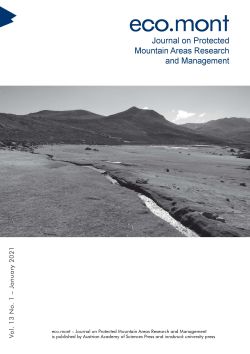 |
 |
Valerie Braun – Martin Coy – Günter Köck (Eds.)
eco.mont
Journal on Protected Mountain Areas Research and Management
Robert Schabetsberger,
Linda Grapci-Kotori,
Halil Ibrahimi,
Astrit BilalIi,
Zlatko Levkov,
Christian D. Jersabek,
Marcel Vorage,
Mathieu Denoël,
Roland Kaiser,
Karin Pall,
Ursula Eisendle,
Erich Eder,
Almedina Sadiku
S. 12 - 21 doi: 10.1553/eco.mont-13-1s12
Verlag der Österreichischen Akademie der Wissenschaften doi: 10.1553/eco.mont-13-1s12
Abstract:
The Balkan Peninsula is a biodiversity hotspot and hosts numerous mountain lakes, which offer a refuge for a multitude of species. However, previous pristine habitats have been deeply affected by anthropogenic change, such as non-native fish introductions, which calls for multi-species considerations in the last remaining unaltered habitats. We carried out abiotic measurements and biodiversity assessments in two neighbouring alpine lakes, Lakes Leqinat and Drelaj in the Bjeshkët e Nemuna National Park in Kosovo, in August 2018. Lake Leqinat is a permanent, stratified water body and exhibits weak oxygen depletion below 3 m. Phytoplankton was dominated by chrysophycean, cryptophycean and chlorophycean algae. Zooplankton consisted of five rotifer species and Daphnia longispina. A mark-recapture experiment yielded a population of alpine newts (Ichthyosaura alpestris) of nearly 4 000 adult individuals. In contrast, cold water from the surrounding karst seeps into Lake Drelaj, which is a well-oxygenated temporary lake. Hence phytoplankton and zooplankton biomasses were considerably lower than in Lake Leqinat. Phytoplankton was dominated by cryptophycean, chlorophycean, and bacillariophycean algae. Zooplankton consisted of the diaptomid copepod Mixodiaptomus tatricus, the cladoceran Daphnia rosea, and the anostracan Chirocephalus diaphanus. Conservation efforts should ensure that Lake Leqinat remains unstocked as introduced fish would probably destroy the natural community.
Balkan Peninsula, conservation, diversity, Ichthyosaura alpestris, plankton Published Online:
2020/12/30 09:40:14 Object Identifier:
0xc1aa5576 0x003c210e
Rights:https://creativecommons.org/licenses/by-nc-nd/4.0/
The journal “eco.mont” – Journal of protected mountain areas research and management – was published for the first time in June 2009.
The journal was founded as a joint initiative of the Alpine Network of Protected Areas (ALPARC), the International Scientific Committee on Research in the Alps (ISCAR), the Austrian Academy of Sciences (ÖAW) and the University of Innsbruck.
The journal aims to highlight research on and management issues in protected areas in the Alps without excluding other protected mountain areas in Europe or overseas. Its target audiences are scientists from all related disciplines, managers of protected areas and interested individuals including practitioners, visitors, teachers, etc.
The journal presents peer-reviewed articles in English by authors who research protected mountain areas and management issues within these areas. It's published twice a year as a collaboration of the Austrian Academy of Sciences Press – responsible for the e-version – and Innsbruck University Press – responsible for the print version.
Die Zeitschrift „eco.mont“ – Zeitschrift zur Forschung in Gebirgsschutzgebieten – erschien im Juni 2009 zum ersten Mal. Die Zeitschrift wurde auf Initiative des Netzwerks Alpiner Schutzgebiete (ALPARC), der Schweizer Akademie der Naturwissenschaften (ISCAR), der Österreichischen Akademie der Wissenschaften (ÖAW) und der Universität Innsbruck gegründet. Sie hat das Ziel, Themen zu behandeln, die gleichzeitig Forschung und Verwaltung in und über die Schutzgebiete der Alpen betreffen, ohne dabei andere Gebirgsschutzgebiete Europas oder anderswo auszuschließen. Diese neue Zeitschrift richtet sich an ein Publikum von Wissenschaftlern der verschiedensten Fachbereiche, an die Verwalter von Schutzgebieten und an alle sonstigen Interessierten, Praktiker, Besucher, Lehrpersonal etc. einbegriffen. Die Zeitschrift veröffentlicht begutachtete Beiträge auf Englisch von Autoren, die Fragen der Gebirgsschutzgebiete und deren Verwaltung betreffen. Sie erscheint zweimal pro Jahr, auf der Basis der gemeinsamen Anstrengungen des Verlags der Österreichischen Akademie der Wissenschaften, der für die digitale Fassung verantwortlich ist, und der Presse der Universität Innsbruck, verantwortlich für die gedruckte Fassung.
|



 Home
Home Print
Print
 References
References
 Share
Share

